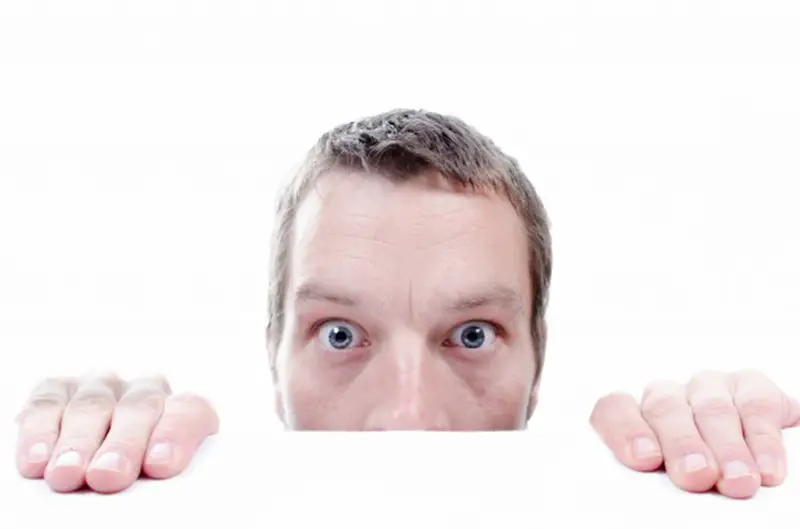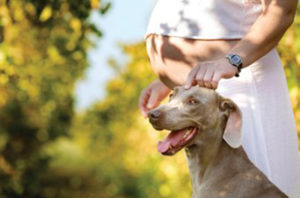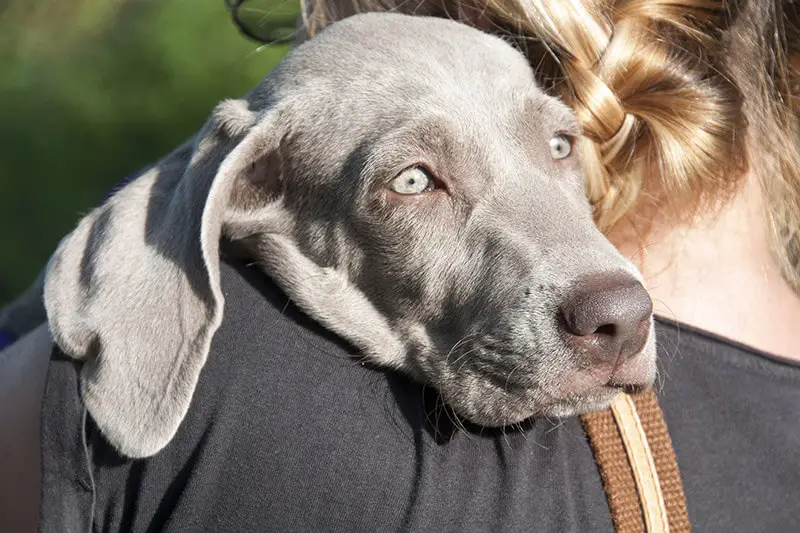Dogs can feel human emotions and accurately feel the situation that their owner is going through. When we are sad, they act as true best friends, and they are extremely effective as part of therapy for various mental health problems. Someone would call it intuition, feeling, or “sixth sense,” but there are clear scientific explanations for these abilities.
We will present to you 11 things the dog knows about you, but also why and where they come from such “power”.
1. Dogs know when we’re sad

While sitting sadly at the edge of the bed, your dog quietly looks at you from the corner of the room. After a certain amount of time, it may sound, lie next to your feet, or drop your head on your lap.
In his eyes, you can easily find some kind of comfort. And this is not only because you are his human family, and that he is sympathetic to the grief of those close to him.
He will come to everyone who he thinks he’s upset in some way, even if he’s a stranger.
According to a study published in the journal Animal Cognition, dogs will sooner come to someone who cries than someone who talks or mumble. In addition, they respond to the sound of the weeping by submissive behavior – by twisting the tail or by lowering the head.
It is not yet certain that they are capable of feeling empathy, but certainly, they are able to distinguish the grief from other emotions.
We suspect that they are quite capable of feeling our pain, as it turns out – when owners simulate a heart attack or make it stumble under furniture, dogs do nothing, or at least do not go for help.
Dogs have a vomeronasal organ through which they can feel diseases such as diabetes and cancer, that is, to pass them on.
With this organ, dogs can make a difference in people’s moods, whether they are tense, sad, happy … They also feel that people are in the mood and on the basis of touch, that is, when the touch is stronger than usual, then they also change their behavior, change position, slit and rebel.
Man’s best friend feels a nervous tension, so your pet will know exactly whether you are relaxed, and even what kind of person you are because it’s a true claim that dogs smell good and positive people.
2. Dogs can sense what your intentions are
Do you think that dogs know when something should happen that they do not like – swimming, going to a veterinarian, cutting nails?
Several studies have confirmed that dogs interpret our intent by following our behavior. Using eye contact, they follow our view to identifying what is in our minds, what we are thinking about and what we will do.
For example, if we look in the bath and we invite him, he knows that bathing time (and preventively escaping). It is known that dogs are mentally at the level of a two-year-old child, which means they can roughly understand about 165 words and interpret the body language.
3. They can smell and recognize when you’re sick

It has been scientifically confirmed that dogs have the ability to detect diseases like cancer in their incredible sense of smell. It’s time to visit a doctor if a dog devotes too much attention to a specific part of your body.
If your dog does not stop sniffing the area around the mole on your hand for days, it would not be a bad idea to visit a dermatologist.
The sense of the scent is up to 10,000 times stronger than humans, and many diseases like lung or prostate cancer cause body odors that dogs can detect.
Therefore, the cases in which dogs are sensed by the scent of the smell of the owner’s disease are not the lies of people who adore dogs – says Dr. Stenly Koren, author of the book “Intelligence of Dogs”.
Dogs can smell drugs and explosives, easily detect subtle body odors and chemical changes in the body that signal the disease. Some are even able to warn owners who are suffering from epilepsy for a few minutes to an hour earlier to experience an attack.
4. Dogs know when you’re scared

Another superpower depends on the sense of smell. If you are scared, your pet will know it at the same time, because it can sense the smell of the hormone adrenaline that connects with fear and danger, and to recognize the characteristic body language.
Larger guard dogs, such as a Doberman or Rottweiler, will immediately hurry to protect you from the threat, while smaller dogs will imitate your behavior.
“Your fear will be taken,” they will become upset. Little advice: if you want to calm them, first regulate and reduce your own fear. Feelings of calm will be transferred to them.
Dogs in the conducted experiment often approached the disturbed people and tried to “comfort” them by pampering. Dogs can feel the fear, but the bad news is that, unless they are guardians, they react fearfully like the owner. So, if you run away from the burglar, your dog will probably follow you.
5. Dogs know when you are unjust
Like many other animals, dogs are sensitive to injustice. Similar to chimps that know the difference between good and bad, they are ready to punish members of their own kind who violate the rules.
One study done in Austria tried to test what happens when half of the respondents are rewarded for a successful job, and half do not get anything.
As it normally happens with children, dogs who did not receive the award became visibly upset when they realized that their colleagues were rewarded. They started scratching and impatiently whining. However, they are not quite capable of making a difference in terms of the size of the prize.
If a dog gets sausage and another piece of bread – both will be happy and satisfied.
A sense of injustice affects not only material things, so it will also be noticed if the redistribution of the owner’s love is unfair. That’s why they are jealous when a new pet appears or when they get caught up in the arrival of a baby in the house or a new romantic partner.
6. Dogs feel when you are angry

Intuition and sensitivity enable them to feel the owners’ anger, but the problem is that they do not know the cause of anger. If you raise the tone of voice and make a typical gesture with a hand that indicates an obstruction, they will recognize that they are in trouble, will become submissive, frightening or sneering.
But they can easily mix up your stress and misinterpret the anger as if it were directed at them even when they did not do anything wrong. Consequently, it changes in behavior, even if there is no need for the team, or become frustrated in the lack of owner’s consistency.
It is important to be responsible in their presence, especially when we are upset so that we do not need to disturb them unnecessarily.
7. Dogs know if you are a generous person
Gentility is closely related to goodness and righteousness. The dog knows when you are generous and altruistic and when selfish, all based on the tone of voice and recognition of emotions (especially anger).
In a study in which dogs watched a set of actors sharing food with homeless people or a set of actors who infuriated the homeless in an aggressive way, dogs were assessed on the basis of the actions we are taking.
When the same set of actors called the dog, they reacted and approached only the generous, while the aggressive group avoided. Dogs are by nature good animals, and similarly, they are expected by humans. They observe goodness and return to love, while selfishness is reacted with fear or lack of trust.
Dogs observe how you behave towards other people and learn from it, according to a study by the University of Milan. During the experiment, dogs watched people who shared a meal with a beggar-actor as people who shouted him out.
After that, the dogs approach the generous person more readily, and scientists believe that this is due to the tone of voice that the person had in conversation with the “beggar”.
So be careful if your dog watches you the next time you argue with a partner or shout at a disobedient child.
8. Dogs can tell if a woman is pregnant

This is not a mistake nor an urban legend. Owners are right when they claim that during their pregnancy dogs become careful, full of love and protective ones.
In the advanced stage, they tend to sniff, touch their stomach and lower their head on it. Also, it seems that it is true that they can slow down the pregnancy well before the woman finds her pregnant.
Several factors could be offered as an explanation. Among the first is the change of smell. Pregnant women have altered body chemistry due to hormonal changes, which leads to a change in odor, and dogs easily recognize it.
They can literally smell pregnancy. To change the physical appearance and do not need some detective ability, but the dog easily notices that the owner of the walk is slower or that she does not like standing up. In the end, they are also sensitive to changes in emotions and moods, so lethargy, fatigue, and tiredness cannot be missed.
A particularly sensitive situation is the birth of a child because the dog is no longer at the center of attention, and this can cause depression.
Wrap the child in blankets, then put your baby in the place where the dog sleeps because it will connect the child’s fragrance to something he likes, Dr. Koren advises.
9. Dogs know when you’re sad
We do not know whether dogs understand the concept of death, but there are numerous prices for dogs who mourn for their owners in front of an empty house or cemetery.
If you lose someone close, the dog understands that you are in sadness and will probably go through a period of grief. They will become even more attentive and more closely connected with the owner, and some even swear by expressing sorrow.
If you have a dog – you must have noticed that he often feels like you. When you are sad and just want to lie in bed – and your pet will come to you and lie next to you, and thus show compassion.
Dogs are just enough to see their boss – they already know how he feels. If you are sad, you can notice that a dog will try to cheer you up, but if it does not succeed in it – it will give up and will behave like you.
After basic research, scientists came to the conclusion that dogs have a high level of empathy for humans, but they can also recognize moods in humans. Before this research, the recognition of mood – as an ability – was attributed only to people.
It’s different in the animal world. Many animals can recognize what other animals “feel” or what their intentions are – but this usually applies only to animals within the same species.
To recognize the feelings of another type – the brain must have the ability to transform images and sounds into mental representations that later evaluate, compare, link, and combine – and thus conclude on the feelings and mood of someone else.
10. Dogs know when you do not like someone
When we are happy, our body releases dopamine and serotonin. The same thing happens when we see someone we do not like and who does not like us, but only a completely different set of chemicals related to hatred, disdain, and fear.
Your dog detects chemical changes and is not very enthusiastic about the person who caused it. Of course, your body language plays a major role.
Since you are their center of the world and unconditionally love and support you, they will mimic your reactions and you will not like people you do not like.
New research has shown that this is not a coincidence and that dogs can really feel who a bad person is or who is afraid of them, and especially if someone is bad to others. In this way, they know how to behave when someone comes or passes by them.
To officially prove it, the researchers asked dog owners to play three different situations in front of their pets.
In the first, the owners were given jars that they could not open. One researcher offered to help, while the other was passive.
In the second, one researcher was passive again, while the second one refused to provide help.
At the end of both scenarios, both researchers offered the dog a treat and as it was expected – the dog ate them both.
In the second part of the research, one researcher behaved rudely against the owner of the dog, yelled, cursed, and did not want to help him to open the jar. When the same offered the dog a candy, the dog was on the astounding of many – refused and did not want to eat it. So the scientists came to the conclusion that the dog can conclude who are bad people and that is without error.
The next time you notice that a particular person does not like your dog, pay attention to her behavior!
11. The dog knows when it can not rely on you
Recent research shows that dogs recognize when we misread them and when they can not rely on our signals. In front of a group of 34 dogs, the experimenters in one case pointed to a container in which food was hidden, while in the second case they were pointing to an empty container.
Then, in the second part, they all pointed their finger into a container that hides food. However, the dogs did not respond to the signaling of a group of experimenters who deceived them in the first “round”.
They used the previous experience to evaluate who is a reliable guide and who can rely on in the future. It is this human unpredictability and inconsistency that can cause stress, aggression, and fear in the dog. Dogs whose owners are prone to inconsistencies, often have behavioral disorders.
How do dogs know all this?
Dogs watch us
Recently, researchers at Kyoto University in Japan have questioned whether dogs react in a similar way. They noticed that dogs are watching people all the time and using the information they collect to decide which people are selfish and who are generous.
Later, when the dogs were in a position to ask for food, they used that information to decide who they would talk to and to choose very generous people very clearly.
It is still unclear, however, whether dogs watch people for their direct benefit (as a signal that they can get a treat from someone) or try to understand what is happening to form a general opinion about the nature and personality of the person to whom it relates.
In a later study, researchers have avoided food complications by creating a social interaction that focuses on an object that is useless to the dog – a roller strip in a transparent box. In total, 54 dogs and their owners participated in the experiment.
The scenario assumed that the dog watches its owner that he is unsuccessfully trying to open the box in which the tape is located.
One situation predicted that the owner is seeking help from an actor who helps him to open the box. In the second variation, the actor would refuse to help and only turn the ice. The last variation assumed that the actor was neutral in relation to the owner who did not even ask for help.
It is important here that dogs watch an unknown person helping or refusing to help their owners in a situation where there is no reward or benefit for the dogs themselves.
Nevertheless, the dog’s observation has influenced their behavior. After the script was made, the actor and neutral observer at the same time offered sweets to the dog.
The researchers watched the person whom the dogs preferred to choose which they avoided.
Dogs love good people
The results show that dogs have avoided the offer from people who did not want to help and prefer to accept the treat from the hand of a neutral person. On the other hand, they equally accepted the offerings of a neutral person and those who helped their owner, without showing a willingness to the actor who helped.
The researchers explain this second conclusion by assuming that dogs consider it “normal” to help others and that is why such behavior is nothing special for them. However, when one refuses to help, he violates this “dog’s morality” and leaves it a negative impression on the dog.
It is interesting that in the same way the children from the experiment that we spoke at the beginning of the text behave in the same way. Perhaps it is evidence that both dogs and humans are doing good, and sometimes only makes them worse.
↓ ↓ ↓ ↓ ↓
If you want to read more interesting facts you can join the discussion on our Facebook group, and you can follow us on Instagram or Pinterest
↓ ↓ ↓ ↓ ↓
↑ ↑ ↑ ↑ ↑
